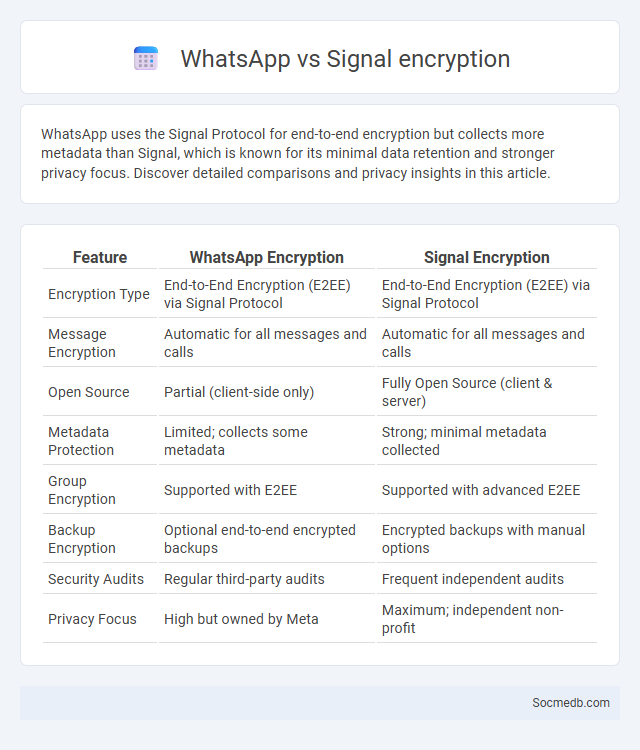
Photo illustration: WhatsApp vs Signal encryption
WhatsApp uses the Signal Protocol for end-to-end encryption but collects more metadata than Signal, which is known for its minimal data retention and stronger privacy focus. Discover detailed comparisons and privacy insights in this article.
Table of Comparison
| Feature | WhatsApp Encryption | Signal Encryption |
|---|---|---|
| Encryption Type | End-to-End Encryption (E2EE) via Signal Protocol | End-to-End Encryption (E2EE) via Signal Protocol |
| Message Encryption | Automatic for all messages and calls | Automatic for all messages and calls |
| Open Source | Partial (client-side only) | Fully Open Source (client & server) |
| Metadata Protection | Limited; collects some metadata | Strong; minimal metadata collected |
| Group Encryption | Supported with E2EE | Supported with advanced E2EE |
| Backup Encryption | Optional end-to-end encrypted backups | Encrypted backups with manual options |
| Security Audits | Regular third-party audits | Frequent independent audits |
| Privacy Focus | High but owned by Meta | Maximum; independent non-profit |
Introduction to Messaging App Encryption
Messaging app encryption secures communication by converting messages into a coded format that only the sender and recipient can decipher. End-to-end encryption (E2EE) ensures that third parties, including service providers, cannot access the content of the messages. Popular platforms like WhatsApp, Signal, and Telegram implement E2EE to protect user privacy and prevent unauthorized data interception.
What is End-to-End Encryption?
End-to-end encryption is a security protocol that ensures only you and the intended recipient can read the messages exchanged on social media platforms by encrypting data from the sender's device until it reaches the receiver's device. This method prevents third parties, including service providers and hackers, from accessing your private conversations, safeguarding your personal information from interception. Implementing end-to-end encryption is crucial for maintaining confidentiality and enhancing privacy in digital communication.
Overview of WhatsApp Encryption Technology
WhatsApp employs end-to-end encryption using the Signal Protocol, ensuring that only you and the recipient can read the messages. This encryption protects texts, voice calls, video chats, and shared media from interception by third parties, including WhatsApp itself. Your communication remains private and secure through continuous updates and robust cryptographic standards.
Signal’s Approach to Encryption
Signal employs end-to-end encryption to ensure that your messages remain private and secure from interception by third parties. The platform uses the Signal Protocol, which combines Double Ratchet Algorithm, pre-keys, and strong cryptographic primitives to protect communication metadata and content. This approach guarantees that only you and your intended recipients can access the exchanged information, making Signal a leading choice for secure social media messaging.
Comparing Encryption Protocols: WhatsApp vs Signal
WhatsApp uses the Signal Protocol for end-to-end encryption, ensuring that messages are protected from interception by third parties, while Signal itself employs the same protocol with an open-source implementation offering enhanced transparency and security verification. WhatsApp integrates encryption within its broader ecosystem, including media and status updates, but relies on centralized servers owned by Meta, which can introduce metadata privacy concerns. Signal emphasizes minimal data collection and uses decentralized designs to maximize user privacy, making its encryption protocols more robust against mass surveillance and potential data harvesting.
Message Security: Privacy Features Breakdown
Social media platforms implement robust encryption protocols and end-to-end message security to protect your private conversations from unauthorized access. Features like two-factor authentication, disappearing messages, and strict privacy settings allow users to control who can view and interact with their content. These privacy enhancements ensure that your data remains confidential, reducing the risk of data breaches and cyber threats.
Metadata Handling: WhatsApp vs Signal
Metadata handling on WhatsApp and Signal significantly impacts user privacy, with WhatsApp collecting extensive metadata such as contact lists, message timestamps, and device information, which is stored on Facebook servers. Signal employs minimal metadata collection practices, only retaining the date and time a user registered and their last connection, ensuring your communication remains highly private and secure. Choosing Signal over WhatsApp offers enhanced metadata protection vital for users prioritizing confidentiality in their social media interactions.
Open Source Transparency and Auditing
Open source transparency in social media platforms enables You to access and review the underlying code, ensuring greater accountability and security. Auditing processes help identify vulnerabilities and verify compliance with privacy regulations, fostering trust among users and developers. This openness encourages collaborative improvements and mitigates risks associated with data misuse or censorship.
Encryption Limitations and Potential Vulnerabilities
Encryption in social media platforms often faces limitations such as incomplete end-to-end encryption, leaving messages vulnerable during metadata transmission or on backup servers. Potential vulnerabilities include susceptibility to man-in-the-middle attacks, exploitation of outdated encryption protocols, and risks from insider threats or poor key management practices. These weaknesses can expose user data to unauthorized access despite encryption efforts, highlighting the need for enhanced security measures and continuous protocol updates.
Which Messaging App Offers Better Encryption?
Signal offers the most robust end-to-end encryption, ensuring your messages remain private and inaccessible even to the app developers. WhatsApp also provides strong encryption using the Signal Protocol, but its data-sharing practices with Facebook may compromise your privacy. For secure communication emphasizing confidentiality, Signal is widely regarded as the better choice for your messaging needs.
 socmedb.com
socmedb.com